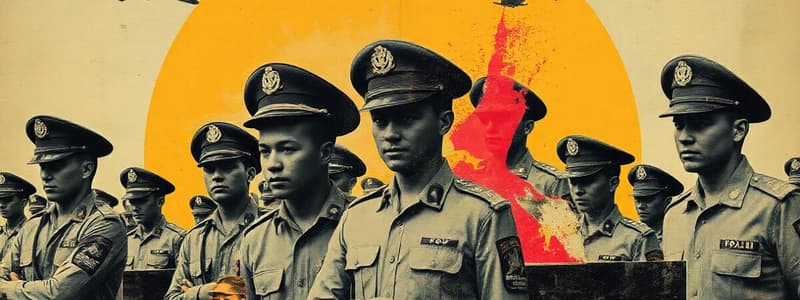Podcast
Questions and Answers
What is the main purpose of the Reserve Officers' Training Corps (ROTC)?
What is the main purpose of the Reserve Officers' Training Corps (ROTC)?
- To conduct annual quality checks of military services
- To provide military training to adult citizens
- To volunteer for national defense preparedness
- To motivate, train, organize, and mobilize tertiary-level students (correct)
What does AATI stand for?
What does AATI stand for?
Annual Administrative and Tactical Inspection
The ______ refers to students enrolled in the Civic Welfare Training Service or Literacy Training Service components.
The ______ refers to students enrolled in the Civic Welfare Training Service or Literacy Training Service components.
National Service Reserve Corps Trainee
Clustering refers to the grouping of students enrolled in the same school only.
Clustering refers to the grouping of students enrolled in the same school only.
What does NSTP stand for?
What does NSTP stand for?
Which of the following is a type of educational institution included in Higher Educational Institutions (HEIs)?
Which of the following is a type of educational institution included in Higher Educational Institutions (HEIs)?
What act institutionalizes the Reserve Officers' Training Corps (ROTC) program?
What act institutionalizes the Reserve Officers' Training Corps (ROTC) program?
What is the role of Major Service Reserve Commands (MSRC) in the ROTC program?
What is the role of Major Service Reserve Commands (MSRC) in the ROTC program?
Flashcards are hidden until you start studying
Study Notes
Reserve Officers' Training Corps (ROTC)
- The Reserve Officers' Training Corps (ROTC) program is established by the Citizens Armed Force or the Armed Force of the Philippines Reservist Act of 1991 ( RA 7077).
- The ROTC program aims to train tertiary-level students for national defense preparedness.
ROTC Key Instruments
- Annual Administrative and Tactical Inspection (AATI) - This tool is designed by the Department of National Defense-Armed Forces of the Philippines (DND-AFP) and conducted annually by the AFP Major services to check the implementation of the ROTC program.
- Clustering - This approach groups students from different schools taking the same NSTP component under a designated school with supervision from TESDA (for Technical Vocational Institutions) or CHED (for Higher Educational Institutions).
- Cross-Enrollment - This system allows students registered in one school to enroll in the NSTP component of another school.
- Higher Educational Institutions (HEIs) - This term encompasses universities, colleges, and other institutions offering higher education.
- Local Universities and Colleges (LUCs) - These are public institutions of higher learning managed by local government units.
- Major Service Reserve Commands (MSRC) - Units of the AFP Major Service responsible for developing reserve forces and overseeing the ROTC program implementation as mandated by RA 7077.
- Mobilization - This denotes the official call-up of ROTC and NSRC Reservists to their mobilization centers, where they perform duty as volunteers.
The 4 Endowments to Envision and Explore Our Future
- Self-awareness - This is the understanding that humans are free to choose between opinion and response.
- Conscience - This refers to connecting with universal laws or principles through our individual talents and limitations.
- Imagination - This is the capacity to envision possibilities beyond the current reality.
- Independent Will - This is the ability to act independently based on our own self-awareness.
Definitions
- State Universities and Colleges (SUCs) - These are public institutions of higher learning established by the national government and governed by independent boards.
- Technical Vocational Institutions (TVIs) - These institutions, public or private, offer Technical and Vocational Education and Training (TVET) programs, including TESDA Technology Institutions, technical vocational institutes, HEI's, SUC's, LUC's, training centers, and enterprises.
- Trust Fund - This refers to the collected NSTP (National Service Training Program) fee, which is used for implementing the NSTP Law, operating the program, and covering contingencies.
NSTP Component Definitions
- National Service - This refers to the civic consciousness and defense preparedness service rendered by all citizens of the Philippines.
- National Service Reserve Corps Trainee - This refers to a student enrolled in either the Civic Welfare Training Service (CWTS) or Literacy Training Service (LTS) component.
- National Service Reserve Corps (NSRC) - This organization is composed of graduates of the CWTS and LTS components of the NSTP, mandated by Republic Act 9163 (NSTP Act of 2001).
- Non-Government Organization (NGO) - This refers to any private organization accredited by CHED, TESDA, and DND to develop and administer CWTS and LTS training modules.
- Private Higher Educational Institutions (PHEIs) - These are private colleges and universities offering higher education.
- Program Components - This term includes the ROTC, CWTS, LTS, and other NSTP programs approved by CHED and TESDA, with DND consultation.
- ROTC Cadet - This refers to a student enrolled in the ROTC Program component.
- School-Based NSRC Units (SBNU) - These are units formed by the NSRC in HEIs participating in the NSTP.
Studying That Suits You
Use AI to generate personalized quizzes and flashcards to suit your learning preferences.




